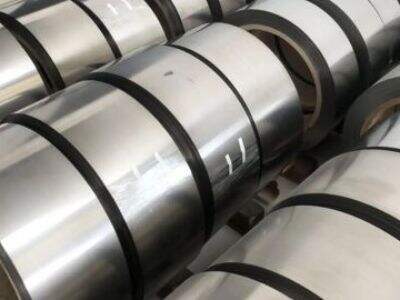Marine engineering is a significant field that deals with the design and maintenance of watercraft such as ships, piers, and other marine structures. F These structures play a crucial role in various activities, such as transportation and fishing. But saltwater can be very destructive to these structures, creating numerous issues and resulting in costly repairs. ReadScientific in nature, they are used as anticorrosive materials in marine engineering — the reason is that they will help in maintaining the safety and supply of other materials.
These strong, corrosion-resistant alloys are specifically developed to prevent saltwater from doing damage. They are made out of a combination of various metals, including nickel, chromium, and molybdenum. All of these metals have different properties that aid the alloys in resisting rust and damage from saltwater. When these alloys are employed, we can avoid forms of corruption that suppress important structures and devices.
A primary benefit of corrosion-resistant alloys is that they protect structures and equipment over time. This long-term immunity means we don’t need to repair them very often, saving time and money. Marine Engineering has become a lot easier and reliable as there are materials which last longer; constant repairs can be a real pain.
Fighting Saltwater Damage with Powerful State of the Art Alloys
Despite the advantages of corrosion resistant alloys in water, however, these alloys are not immune to the rigors of the environment in which they are utilized. Among the biggest issues is saltwater corrosion, when saltwater comes into contact with metal and it leads to rust. Rust weakens metal, which can have serious ramifications over time. High-performance alloys with modifications to suit those salty environments would help alleviate the problem.
They formed high-performance alloys that are much stronger than steel and resist rust in the harshest environments. Sugar will bubble up and steam at really high temperatures, and pressures, and so these alloys are ideally suited to marine engineering. They are durable, which is to say they can continue to work well even when exposed to the ravaging ocean environment. With these high-performance alloys, engineers can make sure that structures and equipment are safe and reliable.
Innovative Concepts of Corrosion Resistant Alloys for Marine Engineering
As technology advances, we are discovering more about corrosion-resistant alloys and how to optimize their performance further. Experts are already working to Electrically heated alloy material, even more resistant to corrosion and with greater strength and durability. So those improvements are very exciting because there needs to be more robust structures and equipment for marine use.
So what? Well, these are new concepts that would allow us to design safer, more efficient structures and systems that work in water. Utilizing the most recent data on corrosion resistant alloys to design marine structures that not only are safer, but also perform better and last longer. Marine engineering is evolving too—the field has a capacity to reinvent itself, and that bodes well for our oceans and the marine industries that depend on them.
Corrosion-Resistant Alloys in Offshore Industries
Marine engineering and corrosion-resistant alloys play a crucial role in offshore industries, such as oil and gas production. Structures and equipment in these sectors need to not only cope with the extreme conditions of the ocean but also mitigate the corrosive effects of saltwater and other corrosive materials. This is why corrosion-resistant alloys are essential to keep everything safe, and running.
However, for offshore industries, the benefits of corrosion resistant alloys cannot be overstated. They help to lower the chance of equipment failure and downtime, which is often quite expensive and unsafe in these scenarios. Offshore companies can reduce environmental damage, improve production efficiency, and maintain safety over the long term with corrosion-resistant alloys. This is not only important for the companies, but for the communities and ecosystems that depend on a healthy ocean.
Why Are Tough Alloys Aligning for Marine Operation
Aerospace and Marine High-Power Alloys: High-strength alloys(this special type also have a best interest in marine engineering) These materials are engineered to offer superior strength and resilience. This property makes it ideal for applications in high-stress and high-strain environments like as ships or some offshore platforms.
The types of marine work in which they are commonly used are numerous and include shipbuilding, offshore platform construction, and underwater pipeline installation. These alloys could resist the ocean's maximum environmental pressures and temperatures, alongside resisting the corrosive effects of saltwater. Thus, they are invaluable for any marine endeavor, where dependability and power are needed!
Located at 2023 end, Kuaike Precision Alloy is a trusted name in top-notch alloys & corrosion-resistant alloys for marine engineering. From saltwater to harsher environments, our alloys deliver protection with long-lasting performance. Our innovative alloys, and dedicated support, make us proud partners in marine engineering projects worldwide, so that our oceans remain safe and productive, for all.
 EN
EN
 AR
AR
 DA
DA
 NL
NL
 FI
FI
 FR
FR
 DE
DE
 EL
EL
 HI
HI
 IT
IT
 JA
JA
 KO
KO
 NO
NO
 PL
PL
 PT
PT
 RO
RO
 RU
RU
 ES
ES
 SV
SV
 TL
TL
 IW
IW
 ID
ID
 SR
SR
 SL
SL
 UK
UK
 VI
VI
 HU
HU
 MT
MT
 TH
TH
 TR
TR
 AF
AF
 MS
MS
 GA
GA
 AZ
AZ
 MN
MN
 MY
MY
 KK
KK
 UZ
UZ
 KY
KY
 BN
BN

